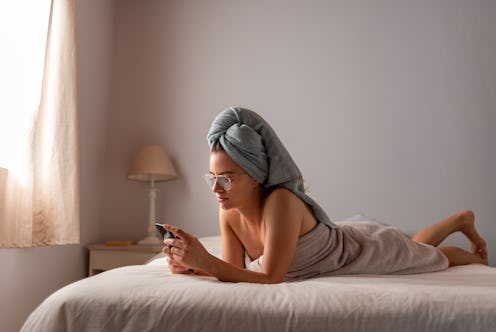
If you’re a fan of a night shower, then chances are you’ve gone to bed with wet hair more than once. Sometimes the desire to sleep is stronger than the desire to dry your hair, after all — and that’s totally understandable. Just know that dermatologists are giving you a subtle side-eye.
While it isn’t the end of the world to go to sleep with damp hair, turning it into a nightly habit can cause more problems than you realize, says Dr. Anna Chacon, M.D., a board-certified dermatologist based in Miami, Florida. The moisture can potentially lead to scalp health issues like irritation, odor, and dandruff as well as hair damage, she tells Bustle, which is why it’s generally recommended to not go to bed with wet hair.
Here’s why: When you lean against your pillows with damp hair, the fabric traps moisture against your scalp where it’s unable to evaporate and dry. This is why you might wake up the next morning with hair that still feels a bit wet, even though it’s been nine hours since you showered. Hair dries a lot faster during the day when you’re up and moving. At night, when you’re buried in blankets with no airflow, it’s a whole different story — but it’s one that you should probably know about. Here’s what happens to your strands if you don’t dry them before falling asleep.
What Happens When You Sleep With Wet Hair
Exposing your scalp to hours and hours of moisture can lead to irritation, dandruff, and odor, says Dr. Brendan Camp, M.D., a board-certified dermatologist. “Damp environments are breeding grounds for microbes, including bacteria and yeast,” he tells Bustle. Not only could you wake up feeling itchy from an imbalanced skin microbiome, but Camp says you might also notice a musty odor.
This imbalance is what contributes to dandruff, too. As Chacon says, the constant moisture can disrupt the natural balance on your scalp, causing it to become dry and flaky. Add in the fact many pillowcases harbor dirt, oil, bacteria, and even fungi, and it’s no surprise wet hair often leads to a flaky scalp.
As if that isn’t enough, wet hair is more prone to breakage, which is why sleeping with a moist mop leaves it more susceptible to damage — think split ends and frizz — especially if you toss and turn on cotton pillows.
How To Sleep With Wet Hair
If you have to climb into bed with damp strands, there are a few ways to get around these scalp-related side effects. After your shower, gently towel dry your hair as much as possible to get rid of excess drips. Better yet, give your scalp a quick blast with a blow dryer, focusing on drying your scalp and roots as a way to prevent bacteria buildup.
Next, place a clean towel over your pillow. “The extra layer may help absorb excess moisture,” Camp explains, especially if you lie back with your hair draped over the towel so that evaporation can do its thing.
Depending on your hair type and goals, it’s also an option to sleep with damp hair up in a hair wrap or braid to limit friction and damage caused by pillows, says Camp. You can also try a heatless styling technique, like curlers, to protect your strands while you snooze. Pro tip: Chacon recommends using a leave-in conditioning spray to help prevent damage.
The bottom line: While it’s tempting to take a warm shower and immediately fall into bed, this habit doesn’t make your hair — or your scalp — very happy.
Studies referenced:
Borda, LJ. (2015). Seborrheic Dermatitis and Dandruff: A Comprehensive Review. J Clin Investig Dermatol. doi: 10.13188/2373-1044.1000019.
Grimshaw, SG. (2019). The diversity and abundance of fungi and bacteria on the healthy and dandruff affected human scalp. PLoS One. doi: 10.1371/journal.pone.0225796.
Saxena, R. (2018). Comparison of Healthy and Dandruff Scalp Microbiome Reveals the Role of Commensals in Scalp Health. Front Cell Infect Microbiol. 2018 Oct 4;8:346. doi: 10.3389/fcimb.2018.00346. PMID: 30338244; PMCID: PMC6180232.
Tao, R. (2021). Skin microbiome alterations in seborrheic dermatitis and dandruff: A systematic review. Exp Dermatol. doi: 10.1111/exd.14450.
Experts:
Dr. Anna Chacon, M.D., board-certified dermatologist
Dr. Brendan Camp, M.D., board-certified dermatologist